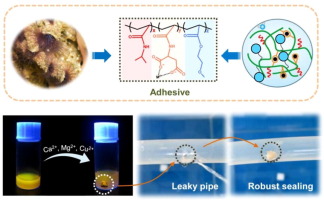Abstract
Synthesis of biomimetic adhesive for achieving robust interface bonding attracts numerous attentions for various applications. Inspired by the metal ions-assisted coacervation mechanism of sandcastle worm glue, novel copolymer/Mn+ complex wet adhesives are synthesized successfully, containing hydrophobic component, bidentate anionic component and temperature sensitive component. The anionic segments in copolymer interacts with different metal ions (Ca2+/Mg2+/Cu2+) in solution through coacervation reaction along with temperature-strengthened dehydration effect, resulting in the formation of biomimetic adhesives. The wet adhesion strength of the biomimetic adhesives is tunable based on the ions species, concentrations and coordination time, while the adhesion mechanisms are analyzed and discussed in details. The biomimetic adhesives not only can be used to tightly bond two solid surfaces underwater, but also is robust and effective in air. For example, current adhesives can firmly bonding various substrates including glass, Si, PTFE and animal bone. More importantly, the biomimetic adhesives are capable of sealing leaky pipes or vessels in harsh wet environment. Due to no dopamine chemistry, current adhesives involve no oxidation problem. We firmly believe this new system would demonstrate promising applications in surface engineering, wet sealing/repairing and tissue engineering.
Synthesis of biomimetic adhesive for achieving robust interface bonding attracts numerous attentions for various applications. Inspired by the metal ions-assisted coacervation mechanism of sandcastle worm glue, novel copolymer/Mn+ complex wet adhesives are synthesized successfully, containing hydrophobic component, bidentate anionic component and temperature sensitive component. The anionic segments in copolymer interacts with different metal ions (Ca2+/Mg2+/Cu2+) in solution through coacervation reaction along with temperature-strengthened dehydration effect, resulting in the formation of biomimetic adhesives. The wet adhesion strength of the biomimetic adhesives is tunable based on the ions species, concentrations and coordination time, while the adhesion mechanisms are analyzed and discussed in details. The biomimetic adhesives not only can be used to tightly bond two solid surfaces underwater, but also is robust and effective in air. For example, current adhesives can firmly bonding various substrates including glass, Si, PTFE and animal bone. More importantly, the biomimetic adhesives are capable of sealing leaky pipes or vessels in harsh wet environment. Due to no dopamine chemistry, current adhesives involve no oxidation problem. We firmly believe this new system would demonstrate promising applications in surface engineering, wet sealing/repairing and tissue engineering.

Keywords Plus:PHRAGMATOPOMA-CALIFORNICAMUSSELPROTEINCHITOSANLINKINGPH
Published in CHEMICAL ENGINEERING JOURNAL,Volume425;10.1016/j.cej.2020.127249,DEC 1 2021


